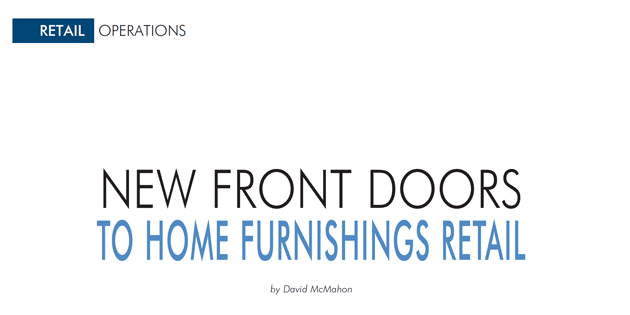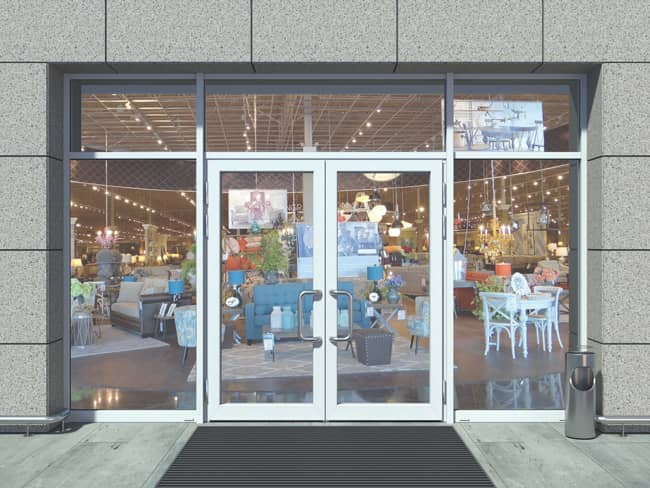
The source and the management of every door to your operation, both virtual and physical, are critical elements for retail business success going forward.
The transition to the new front door is complete. From here on, brick and mortar have become a component of retail in some business models, but it cannot be THE definition of retail. The new "front door” for retail home furnishings business has become the place where shoppers first engage.
Over the past three months, retailers all over North America, have observed a huge shift in consumer behavior. This two-part article will discuss this shift and make suggestions regarding how Furniture World readers can and should adapt their business models.
Retail Never Shut Down
Retail sales never shut down over the past few months even though the buildings operated by "non-essential" businesses such as furniture stores closed.
Many brick and mortar retailers reading this may find it hard to believe that shuttered furniture stores generated significant sales volume during this period. In fact, some omni-channel ready retailers that previously generated a majority of sales based on walk-in traffic managed to generate sales volumes approaching normal levels. This was only possible for operations that were already functioning effectively before COVID-19. These retailers had the ability to ratchet up the digital aspects of their business to adapt and compete with e-commerce retail giants like Wayfair, whose sales exploded during this period.
By contrast, I believe that too many furniture and bedding retailers made the worst possible decision in recent months by posting "we are closed" messages on their websites and putting similar communications on their automated email replies and telephone recordings.
The Biggest Mistake
Retail should NEVER be closed, provided that there remains some capacity for communicating with customers and vendors, ordering product and delivering goods. Businesses that decided to shut down their entire lead funnel, saw sales go to zero.
Business operations are machines that run best while warm. Even those that kept operations going with minimal delivery, sales and service are getting back up to speed with greater efficiency. We can all learn from those who managed to stay running during the darkest time of the pandemic. Those retailers that went “dark” are having more trouble restarting.

Lessons Learned
-
Customers still wanted to connect with retailers during dark times.
The challenges people experienced while sheltering in place, including homeschooling and working from home, created new needs for home furnishings. That's a big reason why customers continued to reach out to retailers who communicated that they remained ready and able to help people improve their home environments.
-
Retailers benefited by aligning with the right suppliers.
Throughout this period vendors and retailers faced similar challenges. Both were forced to change business processes overnight and supply chains were disrupted. Retailers who anticipated this issue, and expanded their inventory of bestsellers, were and are better positioned to adapt to supply chain shortages. Likewise, retailers that aligned with fewer, more reliable vendors are now better able to return to profitability. Good vendor relationships have proven to enable the extension of credit during times of physical retail closure. When reconsidering suppliers to adapt to your current situation you may want to refer to a previous article in this series, "How to Choose the Right Supplier" from the January/February 2019 issue of furniture World found at www.furninfo.com/Authors/David_McMahon/6
-
Keeping key employees was a smart idea.
Businesses that maintained their key managers and top performing sales and operations staff without a lay-off mostly managed to deliver and sell through this period. For a variety of reasons, at the time of this writing, many retailers are also in need of additional talent. Those that were not forced to furlough have fewer issues in talent acquisition. Some have chosen to give their people a bonus using forgivable PPP loan funds they have received.
-
Doing the right thing was the right thing to do.
During the current health crisis, many furniture retailers have extended support to front-line healthcare workers, leading to a heightened sense of community. Furniture and mattress businesses have donated product, time, even health supplies and equipment. They've also given gift cards to other local retailers hard hit by the pandemic. This created local goodwill for retailers who stayed engaged and involved locally, positioning them for a quicker rebound.
-
Business process improvements made during the pandemic will yield big results.
The pandemic accelerated the need for modifications to selling engagement systems, checkout processes, delivery, pick-up and service procedures. As well, owners and managers who kept their retail messaging current, plus accomplished tasks such as repricing, merchandising, training, and general organization, will be glad that they did.
-
Retailers realized the benefits of peer support.
Peer support has been critical to helping many companies navigate these challenging times. Our performance groups, for example, have met virtually, weekly, since the crisis emerged. The sharing of information about what has been working and how to deal with common challenges has drawn members closer together and, I believe, rescued several businesses.
-
Appointment selling has become a powerful tool.
“Appointment Selling” is the silver lining in this whole miserable experience. It is the one big competitive advantage that has emerged giving retailers with physical showrooms an advantage over the likes of Wayfair and Amazon. Retailers with both a physical and digital presence can let customers “test drive it before they buy it.” Sure, online-only retailers can provide 3D imaging and the ability to digitally insert items into photos of customer rooms, but that's not the same experience. Appointment selling saves everyone time by matching a motivated buyer with a skilled salesperson or designer. Done well it helps shoppers make their purchase today — and remain satisfied tomorrow.
Home living and sleep products are an essential product/service, especially in today's stay-at-home economy, which is unlikely to return to pre-pandemic ways of living, business and travel any time soon. Appointment selling has allowed many retailers to safely do business with serious customers who need the essential service that home retail enables. Motivated buyers interacting with professional sellers of home goods have caused close rates to increase to between 60 and 100 percent. Along with this increase, average sales have grown, probably due a greater focus on helping consumers solve their needs in fewer visits.
I see this trend continuing and I believe it should be tracked and marketed accordingly.
The sharing of
information about what has been working
and how to deal with common challenges has drawn members closer together and I believe, rescued several businesses.
|
-
Increased reliance on social networking.
Facebook has become more powerful as retailers continue to rely on its unmatched social platform. Those retailers that cultivated an established following prior to the crisis have been able to successfully introduce appointments, auctions, and videos to generate business.
-
Digital marketing has taken over.
Digital marketing has taken over from traditional media as the dominant consumer-facing media in retail. Over the years, I have joked with retailers that if they ever wanted to know which media really works, they could shut everything off except for one media type and see what happens. During this crisis, this is exactly what many operations did. They shut down all but select digital media. The result for many was that the returns on ad spend went up considerably. In some markets, however, for retailers with a history of broadcasting niche-style messages over traditional media, increased impact was achieved among people who were stuck at home in front of the TV.
-
Lead management should be tracked from the source.
Portals such as Podium, Perq, Chat, and the good-ole telephone are now being described as “the new front door.” This is where the journey or first connection between customers and retailers occurs. This first contact is where retailers should register their "up." Prior to the crisis, and even now, “traffic” meant shoppers entering through a physical doorway. Retailers are pretty good at measuring physical door (last door) swings, The "first door" most actually enter through (website engagement, chat, telephone) has been haphazardly monitored by most. The revelation here about the “new front door” is that the source and management of all doors, virtual and physical, has become a critical element for businesses going forward. Furnishings retailers must, therefore, develop systems processes for shoppers who enter through any door by using “Customer Journey Management.” This is the term I use for walking the customer through the various stages of a purchasing system. For retail home furnishings, this encompasses more than CRM (customer relationship management) due to the unique characteristics of buying and delivering home furnishings.
Next Issue
The next article in this series will explore the connections between “Customer Journey Management,” “Appointment Selling” and “The New Front Door” to look at how you can take advantage of a paradigm shift that has occurred in retail. Until then, remember that an omnichannel retailer, a truly essential retailer, is never closed. Don’t go dark, ever.
More about David McMahon: David McMahon is a retail financial and operational professional and Founder of PerformNOW. He directs multiple consulting projects, is proud to lead 6 business mastermind performance groups: 3 owners groups, 1 sales manager group and 2 operations groups. PerformNOW has 4 primary products to help businesses improve: Performance Groups, Individual Business Consulting, Quarterly Business Reviews and Coaching, Performance Accounting. He is a Certified Management Accountant and Certified Supply Chain Professional. You can connect with David at: https://www.linkedin.com/in/davidwmcmahon/ or david@performnow.net.